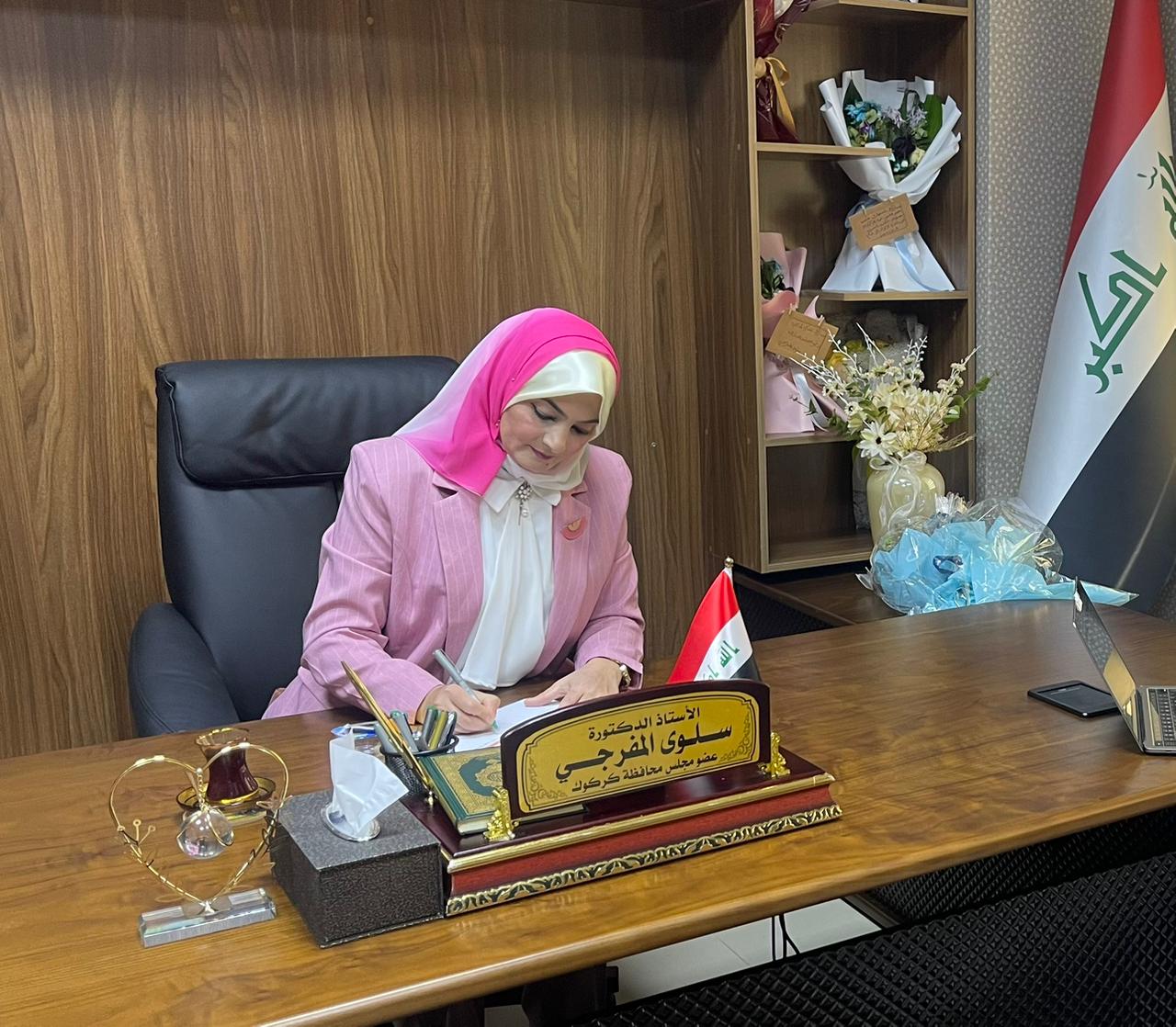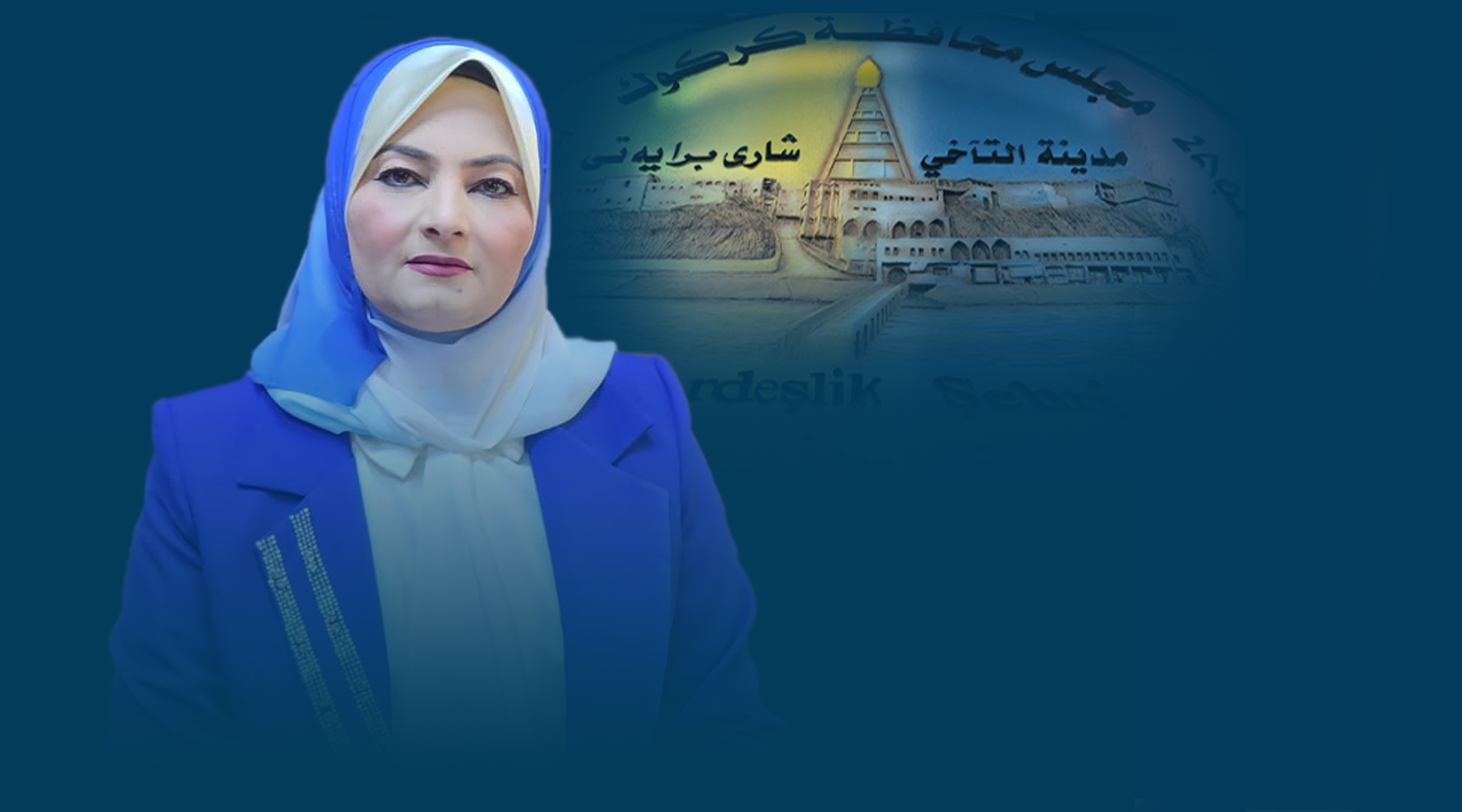Salwa Ahmed Al-Mufarji, the member Kirkuk Provincial Council from the Arab Alliance bloc, confirmed that they are now working as an opposition to monitor the council's performance after boycotting the sessions.
She affirmed her bloc was not invited to attend the session to elect the governor, which she considered a violation of the rights of the Arab component because they are elected by the people and have responsibilities towards their constituents.
Al-Mufarji indicated in an interview with KirkukNow that they are awaiting the Federal Supreme Court's decision. She expressed confidence that the judiciary will be the final judge in determining the legitimacy of the session.
Al-Mufarji said that if the Federal Court approves the legitimacy of the session held at Al-Rasheed Hotel last August, they will consult with the blocs they represent to and then participate in the upcoming sessions. She indicated that as elected members, they are committed to attending the sessions because their constituents demand that they provide services.
She added that they will vote on any decision that serves the interests of the Arab component and Kirkuk.
Arab and Turkmen local officials, filed lawsuits to the Federal Supreme Court on behalf of the Arab and Turkmen components against August 10 session in Baghdad that led to the formation of the Kirkuk local administration.
The complaints focus on the cancellation of the provincial council session that took place on August 10 at the Rashid Hotel in Baghdad. This session resulted in the election of council officials, the governor and one deputy, despite the absence of seven council members who boycotted the meeting.
Al-Mufarji explained that boycotting sessions is a constitutional custom, not a legal one, and that attending council sessions is a realistic matter. She stated that, based on the internal regulations, the members were elected for a one-month period, and a new internal regulation must be formed to determine the number of sessions a member must attend. This would clarify how members are dealt with, whether by approaching their blocs or issuing direct warnings to them. Up until now, they, as members, have no idea about the council's bylaws.
She stressed that she continues to work within the provincial council and has been performing her duties for three weeks from her office. She noted that they have not been notified of the arrival of ministers or important figures to the province, which deepens the gap between them and the rest of the council members.
She stressed that despite her bloc's political boycott, they are administratively committed to work, stating that "all members are brothers." The discrimination practiced within the council or the provincial office deepens this gap. She touched on the visit by the Minister of Migration and Displacement, Evan Gabro, without their knowledge, considering that they have the right to meet with her. She was present in the council and was not informed of that.
She stressed that their political position is different, but administratively, they have a public that demands they provide services, and the government must deal objectively.
The northern, oil-rich, ethnically mixed province of Kirkuk is home to about 1,77 million Kurds, Turkmen, and Arabs. Located 238 kilometers north of Baghdad, Kirkuk has long been at the center of disputes between the federal government in Baghdad and the Kurdistan Regional Government KRG.

Regarding the voting process on the committees, Salwa Al-Mufarji explained, "We must have an internal system through which we know how many committees we have in the governorate and then discuss the issue of the committees. Is it reasonable that before the internal system of the council is enacted, we divide the committees? I am supposed to have committees with a specific number that must be individual, and each member has the right to head a committee and be a member of other committees."
She explained that as a member, she did not see the minutes of the second and third provincial council sessions and does not know what the council’s decisions were.
“It is more appropriate for every member to obtain the minutes of the session to know what happened and then prepare himself for the next session. There is an administrative error.”
Regarding the delay in forming committees and the draft budget, the provincial council member from the Arab coalition said, “It is not my fault. The council has a majority, so let them form the committees and start their work.”
She added that they are “now working as an opposition to monitor the council’s performance.”
Nine out of 16 council members from Baghdad were present on August 10 to meet the quorum, appoint the presidency, and establish the pillars of local administration. This occurred despite protests and boycotts from some members of the Arab faction, Turkmen (the Iraqi Turkmen Front ITF two seats), and the Kurdistan Democratic Party (KDP) two seats).
Al-Mufarji said that the old internal regulations are still in effect and stipulate that a council session be held every Tuesday. They are surprised by sessions being held on holidays, for example, a session is held on Saturday at 4 pm.
She added that she submitted an official request to know the minutes of the sessions but has not received any answer yet, despite submitting the request three weeks ago. Dr. Salwa Al-Mufarji explained that they are talking about sending official letters to invite the blocs to the council, but she has not received any official letter in this regard yet.
"There is no problem between us as members. The problem lies in the pursuit of occupying positions, as everyone seeks to obtain a certain position and forgets that we are colleagues and will meet in important future decisions.”
She pointed out that there is talk about the positions of the Turkmen bloc being reserved, but she wondered, "What about the Arab coalition, which represents the largest bloc in the council? I have not heard anyone talk about guaranteeing our share."
The Arabs held all senior positions in Iraq, including Kirkuk, up to 2003. Since 2005, the Kurds have held the senior positions in Kirkuk, including the governorship, up to October 2017 when Iraqi troops ousted the Kurdish forces following the declaration of victory over the Islamic State in Iraq and the Levant (ISIL) and the Kurdish referendum for independence.
The Kurdish governor was replaced late 2017 by acting governor, Rakan al-Jibouri, an Arab, who currently with the Turkmen oppose election of the new governor.
She expressed her dissatisfaction with not being invited to any meetings, such as the last meeting held to discuss job grades without notifying them, which leads to an increase in the gap and prevents them from serving citizens effectively.
She explained that despite boycotting the sessions, she is not boycotting administratively but rather continues her work and is charged with public service. She stressed that as a member, she has rights and duties, demanding clear decisions announced in advance for the sessions so that they can discuss them in a transparent manner.
She stressed that the relationship between them as members is good, but the problem is related to mismanagement.
“I am committed to my duty before the government departments, and I will do my job by monitoring the work of the council, and in the coming period, I will conduct a group of interrogations of the general managers in the province.”
*This story has been produced as part of the 'Budget is Your Right' initiative, with support from the National Democratic Institute (NDI).





